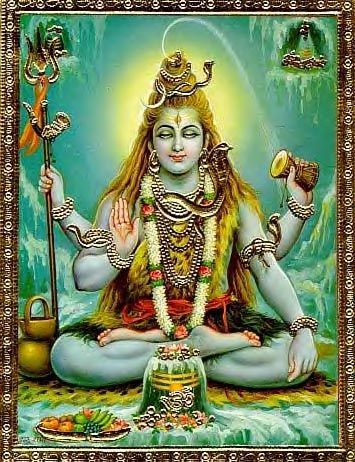Hinduism
A religion with 648 million followers, Hinduism developed from indigenous religions of India in combination with Aryan religions brought to India around 1500 BC. It was codified in the Veda and the Upanishads-the sacred scriptures of Hinduism. Hinduism is a broad term used to describe a vast array of sects to which most Indians belong. Although many Hindus reject the caste system-a belief that people are born into a particular subgroup that determines their religious, social, and work-related duties-it is widely accepted. This system classifies society at large into four groups: Brahmins or priests; rulers and warriors; farmers and merchants; and peasants and laborers. The goals of Hinduism are the release from repeated reincarnation through the practice of yoga, adherence to Vedic scriptures, and devotion to a personal guru. Various deities are worshipped at shrines; the Divine Trinity-representing the cyclical nature of the universe-are: Brahma the creator, Vishnu the preserver, and Shiva the destroyer.
Atheism (Sanskrit: nir-īśvara-vāda, lit. "statement of no God", "doctrine of godlessness") or disbelief in God or gods has been a historically propounded viewpoint in many of the Hindu philosophies
There are six schools of thought within Hinduism addressed as the Shat (Astik) Darshana (darshana meaning "viewpoint.") Within the Astika schools of Hindu philosophy, the Samkhya and the early Mimamsa school did not accept a God in their respective systems.
The atheistic viewpoint as present in the Samkhya and Mimamsa schools of Hindu philosophy takes the form of rejecting a creator-God. The Samkhya school believed in a dual existence of Prakriti ("nature") and Purusha ("spirit") and had no place for an Ishvara ("God") in its system. The early Mimamsakas believed in a adrishta ("unseen") that was the result of performing karmas ("works") and saw no need for an Ishvara in their system. Mimamsa, as a philosophy, deals exclusively with karma and thus is sometimes called Karma-Mimamsa. The karmas dealt with in Mimamsa concern the performance of Yajnas ("sacrifices to gods") enjoined in the Vedas.
The Vedanta philosophy had its practitioners advocating a Nirguna Brahman of which the most prominent example is Adi Shankara.
Nastika Atheism
In Indian philosophy, three schools of thought are commonly referred to as Nastikas: Jainism, Buddhism and Cārvāka for rejecting the doctrine of Vedas. Nastika refers to the non-belief of Vedas rather than non-belief of God. However, all these schools also rejected a notion of creationist god and so the word Nastik became strongly associated with them. Cārvāka, an atheistic school of Indian philosophy, traces its origins to 600 BCE. It was a hedonistic school of thought, advocating that there is no afterlife. Cārvāka philosophy appears to have died out some time after 1400 CE. Buddhism and Jainism also have their origins before 300 BCE but are not hedonistic. It is debated whether the ancient followers of the Jain and Buddha paths were Hindu or non-Hindu because they, like Hinduism, discussed the Arya Sangh, karma, brahman and Moksha.
Hindu atheists in recent times
The Indian Nobel Prize-winner Amartya Sen, in an interview with Pranab Bardhan for the California Magazine published in the July-August 2006 edition by the University of California, Berkeley states:
"In some ways people had got used to the idea that India was spiritual and religion-oriented. That gave a leg up to the religious interpretation of India, despite the fact that Sanskrit had a larger atheistic literature than exists in any other classical language. Even within the Hindu tradition, there are many people who were atheist. Madhava Acharya, the remarkable 14th century philosopher, wrote this rather great book called Sarvadarshansamgraha, which discussed all the religious schools of thought within the Hindu structure. The first chapter is "Atheism" - a very strong presentation of the argument in favor of atheism and materialism.
| The following article is a Work In Progress. At present nobody is working on this article. If nobody is specifically working on this page, you are invited to help edit it and make it better. |
|---|
This site costs a lot of money in bandwidth and resources. We are glad to bring it to you free, but would you consider helping support our site by making a donation? Any amount would go a long way towards helping us continue to provide this useful service to the community.
Click on the Paypal button below to donate. Your support is most appreciated! |
|---|



